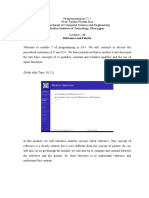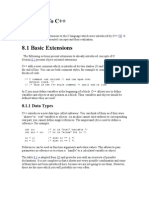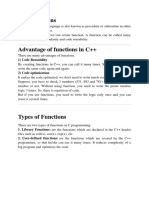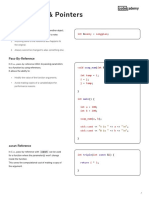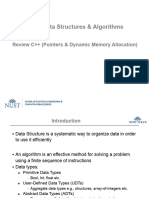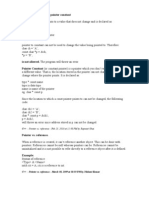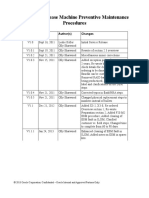Notes on constant referencing (const &)
Constant referencing, i.e. const &, means that a memory address is passed.
When we use const & for a parameter, we indicate that we want to use a reference parameter but
that the parameter may not be changed inside the body of the function.
Remember that a memory address is a pointer. For a reference parameter, the memory address of
the parameter (a pointer) is passed when the function is executed. This allows the function to change
the value of the parameter in the main function or calling function. When we add const to that, we
still pass the memory address, but we indicate that the value of the parameter may not be changed.
This cause the const & parameter to be treated like a value parameter.
We use a constant reference (const &) to save memory space and time, because the compiler does
not have to copy the entire parameter to new memory space for the function, as it would do for a
value parameter.
See for example the difference between the following functions:
void aFunction(anObject a)
{
//do something
}
void anotherFunction(& anObject b)
{
//do something
}
void yetAnotherFunction(const & anObject c)
{
//do something
}
In function aFunction we pass object a as a value parameter. This means that the compiler will
copy the object a to the stack frame in CPU memory where the function is executed, using a certain
amount of CPU time and memory space. The function may change the parameter, but this will be
local to the function, so that no changes to the actual parameter will be in effect after the function has
executed.
In function anotherFunction we pass object b as a reference parameter. This means that the
compiler will pass the memory address of the object b (a pointer) to the stack frame in CPU memory
where the function is executed. The only additional time or memory space used, is for passing the
memory address or pointer and the time necessary to do that. This also allows function
anotherFunction to change the value of the parameter and return that value to the calling function.
Any changes made to the parameter, will therefore be reflected in the value of the actual parameter
after the function has executed.
In function aFunction we pass object c as a constant reference parameter. This means that the
compiler will pass the memory address of the object c (a pointer) to the stack frame in CPU memory
where the function is executed. The only additional time or memory space used, is for passing the
memory address or pointer and the time necessary to do that. The const modifier will prevent any
changes to the parameter, so that no changes to the actual parameter will be in effect after the
function has executed. We have saved memory space and time, and protected the actual parameter
against any changes.





